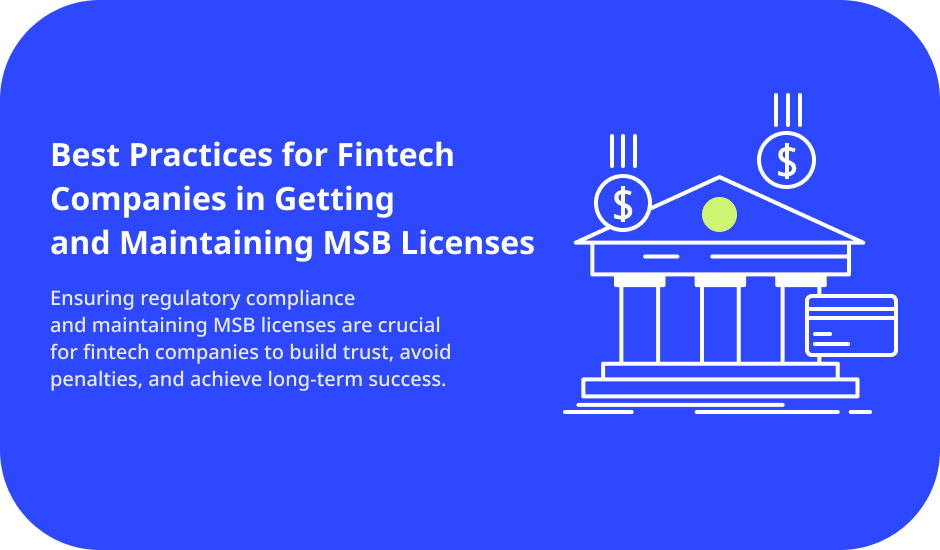MSB licenses are essential for fintech companies, serving as a seal of regulatory compliance and trustworthiness. They enable fintechs to operate within the legal financial framework, avoiding penalties and fostering customer confidence.
The journey to secure and uphold these licenses is fraught with challenges, from adhering to strict AML protocols to conducting comprehensive KYC procedures. This guide offers valuable strategies for fintech companies to manage compliance effectively.

Understanding MSB Licensing Requirements
MSB licenses, short for Money Services Business licenses, are part of a regulatory framework designed to oversee companies that handle money-related services. The rules and laws around MSB licenses are there to prevent illegal activities like money laundering and to make sure companies are handling money properly.
They have to follow rules that include checking who their customers are (that’s the KYC, or Know Your Customer, rule) and keeping an eye out for any suspicious money movements.
The types of activities that need an MSB license include sending money between people or places (money transmission), changing money from one currency to another (currency exchange), and helping to process payments (payment processing). These licenses are important because they help keep the financial system safe and trustworthy. If a company doesn’t follow these rules, it can get into serious trouble.
Key Steps in Obtaining an MSB License
To get an MSB license, fintech companies need to follow a few important steps. First, they have to fill out an application and provide lots of documents that show who they are and how they do business. This includes things like a detailed business plan, policies for preventing money laundering, and information about the people who own and run the company. It’s really important to make sure everything is done right and follows the rules, which is called due diligence. The company also has to file certain forms with regulatory bodies.
Compliance Best Practices
Once a fintech company has an MSB license, they need to keep following best practices to stay compliant. This means setting up strong programs and rules within the company to make sure they keep following the law.
They should regularly check their own processes and fix any problems they find, which is called doing audits and risk assessments. Training for employees is super important so that everyone knows the rules and how to follow them. It’s also a good idea for companies to talk to regulatory agencies and get advice to make sure they’re doing everything correctly.
Maintaining Compliance Post-Licensing
Maintaining compliance with Money Services Business (MSB) licensing requirements is crucial for the continued operation of your business.
Monitor Regulatory Changes
Stay informed about the latest regulatory developments. This can be achieved by subscribing to updates from financial regulatory bodies, attending industry conferences, and participating in relevant training sessions. When new regulations are announced, review your existing compliance policies and update them as necessary to align with the new requirements.
Conduct Ongoing Risk Assessments
Regularly evaluate the risks associated with your business activities. This involves identifying potential areas of non-compliance and assessing the likelihood and impact of these risks. Based on this assessment, adapt your compliance measures to mitigate identified risks effectively. It’s important to document these assessments and the steps taken to address any issues.
Respond Promptly to Regulatory Inquiries
If a regulatory body contacts you with inquiries or requests for information, respond as quickly and thoroughly as possible. This demonstrates your commitment to compliance and transparency. In case of any identified compliance deficiencies, take immediate action to rectify them and communicate these actions to the regulator.
Challenges and Risks
Following are some main points which cover the main issues like regulatory requirements, keeping up with compliance standards, dealing with operational and tech challenges, and avoiding reputational risks.
- Complex Rules: They have to understand many difficult rules that keep changing.
- Staying Up-to-Date: It’s hard to always follow the latest rules and do what they say.
- Tech Problems: Using technology to follow these rules can be tricky.
- Bad Reputation: If they don’t follow the rules, people might think badly of them.
Case Studies and Examples
In our portfolio, we have more than 50 successful case studies of obtaining MSB licenses. Here you can find one of them, under NDA:
Background: Company A, a fintech startup, who’s aim was to build a disruptive digital bank. To achieve this vision, they needed to obtain an MSB license and implement the IT solution, or whitelabel, or SaaS.
Solution Provided by BMP Global: We deployed a team of experts to guide Company A through the intricacies of obtaining an MSB license, ensuring full compliance with regulatory standards. We helped the company to obtain the license and provided them with SaaS that is built specially for digital banks.
Conclusion: Through strategic collaboration with us, Company A not only overcame regulatory hurdles to acquire an MSB license but also implemented their vision of establishing a state-of-the-art digital bank.
To get a free consultation, consult our expert.
To get a free consultation, consult our expert.
Conclusion
Compliance is crucial for fintech companies in both obtaining and maintaining MSB licenses. It's not just about following rules; it's about building trust with customers and regulators. If you are interested in obtaining of an MSB license, contact our expert.













